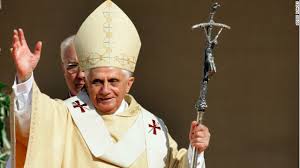From the beginning, part of the narrative about Pope Francis has been that he’s sort of the anti-Pope Benedict XVI. Where Benedict was cold and aloof, Francis is seen as warm and populist; where Benedict was rigid and dogmatic, Francis is open and flexible; where Benedict was a man of the system, Francis is the antidote to it.
One could go on crafting different ways of making the same point, but the idea is clear: Benedict and Francis are often set in opposition.
To be clear, Francis himself has never fuelled that narrative. Right after his election he took a helicopter out to Castel Gandolfo, the summer residence where his predecessor was staying, in order to embrace Benedict. The first encyclical issued by Francis, Lumen Fidei in June 2013, was largely based on a draft by Benedict, and Francis has invited Benedict to take part in several big events.
We got another reminder that the real story is continuity, not rupture, with publication of a rare interview with Benedict after retirement on Wednesday, showcasing why he’s considered one of the best theological minds ever to occupy the Throne of Peter.
The interview took place in October 2015, as part of a conference in Rome on the traditional Christian doctrine of justification by faith, and was conducted by the Rev. Jacques Servais, a Jesuit priest and theologian.
To the extent there was a headline, it was Benedict’s assertion that there’s a “deep double crisis” facing the Faith, as a result of the modern theological belief that people can be saved outside Christianity. While endorsing that belief, Benedict says it’s created a loss of motivation for missionary work and also sown doubt as to why one should put up with the demands of Christianity if you can get to Heaven without them.
All that is certainly true, though it’s not the first time Benedict has made the point.
Vis-á-vis Francis and Benedict, the most interesting portion of the interview comes in Benedict’s reflections on mercy. I’m going to put the following far more loosely than Benedict ever would, but it’s the gist of things.
In a nutshell, Benedict’s argument is that 500 years ago, when the Protestant Reformation happened, people took the existence of God for granted and assumed that God must be pretty ticked off at what a mess human beings have made of the world. Therefore, the driving question was how any human being could be saved.
Martin Luther answered that question by saying it’s faith alone, while the Catholic Church insisted it’s faith plus good works, laying the basis for a great schism.
Humanity
Today, Benedict says, the terms of debate have been reversed. Modern women and men look around at all the violence, evil and corruption in the world, and ask what sense it makes to believe in a loving God.
In other words, it’s no longer humanity that has to justify itself before God; it’s God who has to justify himself to humanity.
Benedict believes God’s answer to that challenge is mercy.
According to Benedict, God cannot just make all the evil in the world disappear, because to do so would be to rob humanity of freedom. What God can do is to show mercy, thereby encouraging people to be merciful with one another. Mercy is at the heart of the Christian story, with God’s only son being willing to die amid “the suffering of love”.
“Only where there is mercy does cruelty end, only with mercy do evil and violence end,” Benedict says.
This brings us by a short route to Francis, since he’s all about mercy.
It’s quite literally his motto as Pope, which is a three-word Latin phrase, miserando atque eligendo, roughly meaning “choosing through the eyes of mercy”.
His first Sunday homily as Pope featured the claim that “the strongest message of the Lord is mercy”, and right now we’re in the middle of a special jubilee Holy Year called by Francis and devoted to the theme of mercy.
The most famous sound bite associated with Francis, “Who am I to judge?”, is an expression of mercy, as is his attitude toward so many issues and constituencies – the poor, war, divorced and remarried Catholics, and so on.
“Pope Francis is totally in agreement with this line,” Benedict says. “His pastoral practice is expressed in the fact that he continually speaks to us of God’s mercy. It is mercy that moves us toward God, while justice frightens us before him.”
As Benedict sees it, he inherited the emphasis on mercy in recent papacies from St John Paul II, laid out the intellectual case, and then handed it on to Francis, who’s taking the message to the streets.
At the level of Church politics that thumbs-up is fairly important, since some of Francis’ biggest critics come among the very theological conservatives who cherish Benedict.
The bottom line, therefore, is that the narrative has the story wrong. The relationship between Benedict and Francis isn’t Ali v Frazier, or Coke v Pepsi; it’s more akin to Lennon and McCartney, or Rolls and Royce. Granted, Benedict and Francis have very different personalities, but then so did Martin and Lewis or Holmes and Watson, which didn’t stop them from making some magic together.
This isn’t a rivalry, in other words, but actually one of the more intriguing partnerships in recent Christian history.
John L. Allen Jr is Associate Editor of CruxNow.com


 John L. Allen Jr.
John L. Allen Jr. Pope Benedict
Pope Benedict